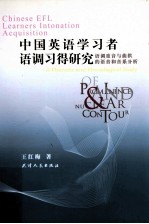图书介绍
中国英语学习者语调习得研究 语调重音与曲拱的语音和音系分析PDF|Epub|txt|kindle电子书版本下载

- 王红梅著 著
- 出版社: 天津:天津人民出版社
- ISBN:9787201059971
- 出版时间:2008
- 标注页数:278页
- 文件大小:13MB
- 文件页数:304页
- 主题词:
PDF下载
下载说明
中国英语学习者语调习得研究 语调重音与曲拱的语音和音系分析PDF格式电子书版下载
下载的文件为RAR压缩包。需要使用解压软件进行解压得到PDF格式图书。建议使用BT下载工具Free Download Manager进行下载,简称FDM(免费,没有广告,支持多平台)。本站资源全部打包为BT种子。所以需要使用专业的BT下载软件进行下载。如BitComet qBittorrent uTorrent等BT下载工具。迅雷目前由于本站不是热门资源。不推荐使用!后期资源热门了。安装了迅雷也可以迅雷进行下载!
(文件页数 要大于 标注页数,上中下等多册电子书除外)
注意:本站所有压缩包均有解压码: 点击下载压缩包解压工具
图书目录
Chapter One Introduction1
1.1 Research background1
1.2 Purpose of the study5
1.3 Significance of the study7
1.4 Organization9
Chapter Two Literature Review11
2.1 Approaches to English intonation12
2.1.1 The British configurational approach12
2.1.2 The American level approach14
2.1.3 The IPO approach15
2.1.4 The AM approach16
2.1.4.1 Fundamental principle of the AM approach16
2.1.4.2 Stress analysis in the AM approach19
2.2 English prominence distribution rule22
2.2.1 Content words and function words22
2.2.2 Nuclear stress rule(NSR)by Chomsky and Halle(1968)23
2.3 Intonation characteristics of English and Chinese26
2.3.1 Intonation characteristics of English26
2.3.1.1 Vowel compression and truncation26
2.3.1.2 Prominence grid27
2.3.1.3 Tendency toward isochrony29
2.3.2 Characteristics of Chinese intonation30
2.3.2.1 Tones in Chinese30
2.3.2.2 Syllable-timed language31
2.3.2.3 Sentence intonation and word tonal contour interaction32
2.3.2.4 Pitch range variation33
2.3.3 Problems in intonation acquisition for Chinese learners33
2.4 OT and Learnability35
2.4.1 OT basics35
2.4.2 Intonation in OT38
2.4.3 Learnabilitv issue in OT39
2.5 Relevant studies on English intonation acquisition41
2.5.1 Previous researches on English intonation in SLA41
2.5.2 Previous researches on Chinese learners45
2.6 Summary50
Chapter Three Research Design52
3.1 Research questions52
3.2 Subjects54
3.2.1 Chinese learners of English54
3.2.2 British speakers55
3.3 Reading material and experiment sentences56
3.3.1 Reading material56
3.3.2 Experiment sentences57
3.4 Read speech corpus58
3.4.1 Selection of the native speakers'recordings58
3.4.2 Recordings of Chinese learners59
3.5 Scoring and group division60
3.5.1 Scoring and correlation among the six scorers60
3.5.2 Group division62
3.6 Labeling the recorded material64
3.6.1 Labeling instrument64
3.6.2 Labeling system65
3.6.3 Labeling procedure71
3.6.4 Prominence identification73
3.6.4.1 Pitch accent identification74
3.6.4.2 Intensity and duration identification75
3.6.4.3 Semantic cues in prominence identification76
Chapter Four Prominence Analysis and Discussion79
4.1 Introduction79
4.2 Prominence in declarative sentence80
4.2.1 The British speakers80
4.2.2 The high group of Chinese learners82
4.2.3 The low group of Chinese learners84
4.2.4 Comparative analysis86
4.3 Prominence in exclamatory sentence90
4.3.1 The British speakers90
4.3.2 The high group of Chinese learners92
4.3.3 The low group of Chinese learners93
4.3.4 Comparative analysis94
4.4 Prominence in imperative sentence97
4.4.1 The British speaker97
4.4.2 The high group of Chinese learners98
4.4.3 The low group of Chinese learners100
4.4.4 Comparative analysis101
4.5 Prominence in tag question103
4.5.1 The British speakers104
4.5.2 The high group of Chinese learners105
4.5.3 The low group of Chinese learners106
4.5.4 Comparative analysis108
4.6 Prominence in yes/no question111
4.6.1 The British speakers111
4.6.2 The high group of Chinese learners113
4.6.3 The low group of Chinese learners114
4.6.4 Comparative analysis115
4.7 Prominence in wh-question119
4.7.1 The British speakers119
4.7.2 The high group of Chinese learners120
4.7.3 The low group of Chinese learners121
4.7.4 Comparative analysis123
4.8 Prominence in declarative question126
4.8.1 The British speakers126
4.8.2 The high group of Chinese learners128
4.8.3 The low group of Chinese learners129
4.8.4 Comparative analysis130
4.9 Discussion133
4.9.1 Number of stressed words133
4.9.2 Shared prominence patterns135
4.9.3 Distinctive prominence patterns136
4.9.4 Fitness test between the learners and the NS138
4.10 Summary141
Chapter Five Nuclear Contour Pattern Analysis143
5.1 Introduction143
5.2 Nuclear contour in declarative sentence145
5.3 Nuclear contour in exclamatory sentence147
5.4 Nuclear contour in imperative sentence149
5.5 Nuclear contour in tag-question151
5.6 Nuclear contour in yes/no-question153
5.7 Nuclear contour in wh-question155
5.8 Nuclear contour in declarative question157
5.9 Discussion159
5.9.1 Universals about English nuclear contour patterns159
5.9.2 Nuclear contour patterns for the NS162
5.9.3 Nuclear contour patterns for the Chinese learners167
5.9.3.1 Chi-square test of the nuclear contour patterns168
5.9.3.2 Recoded nuclear contour patterns170
5.10 Summary174
Chapter Six An OT Diagnosis175
6.1 Introduction175
6.2 An OT diagnosis on prominence distribution patterning176
6.2.1 Prominence distribution patterning for the NS176
6.2.1.1 Prominence constraint ranking for the NS176
6.2.1.2 OT diagnosis on seven sentences178
6.2.2 Prominence distribution patterning for the Chinese learners189
6.2.2.1 Prominence constraint ranking for the Chinese learners189
6.2.2.2 OT diagnosis on seven sentences190
6.3 An OT diagnosis on nuclear contour structure210
6.3.1 Nuclear contour finite-state grammar210
6.3.2 The OT analysis of nuclear contour structure211
6.4 Summary214
Chapter Seven Conclusions215
7.1 Major findings215
7.2 Contributions218
7.3 Implications220
7.4 Limitations and further studies223
Bibliography225
Appendix A Reading passage246
Appendix B Scores for the HG and the LG249
Appendix C Speech spectrum of the NS samples251
Appendix D Speech spectrum of the learner samples255
Appendix E Prominence fitness in read speech262
Appendix F Nuclear contour Chi-square test in read speech265